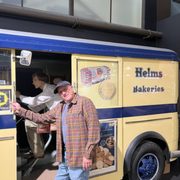Prairie S.
Yelp
Tucked away on a Baldwin Hills residential alcove is this delightful garden, that is also a thoughtfully designed nature center. Its name comes from an erstwhile primary school on the site. The history of the surrounding neighborhood is worth learning about, inside the friendly visitor's center. The classic U.S. American story of racial segregation and painful integration of previously all-white neighborhoods played out here, in our lifetimes, and if you're attentive along the route up to the park, you'll see the black-owned homes.
The garden itself has several sections dedicated to reviving indigenous ecology which is a way of piecing back the world destroyed by modern technology, urbanization, and commercial consumption. This garden offers one of the best descriptions of the indigenous peoples that populated the Los Angeles basin I have seen in LA. Unlike too many other places that perpetuate the "magical erasure" of indigenous peoples by white invaders, this park gives visitors a more honest sense of place which includes the original people and their relationship to the land. The small efforts at restoration of the indigenous plants seem like a valient and gentle effort at countering euro-American modernity.
When you look north across the expanse of Los Angeles you will see the results of the white man's relationship to this place...and the unmitigated sprawl of Los Angeles. The west to east expanse of concrete blocks and traffic arteries spans the LA basin then creeps up the Santa Monica mountain range (that runs like a west-east wall). Look eastward along the hills and the Hollywood sign and the Griffith Observatory are clearly visible. As well you can catch sight of the actively drilling oil wells of the Baldwin hills complex, and there is a sign about oil's relationship to this town.
The garden has a section of vegetable and herb growing boxes which are complemented by a series of compost-making containers and an open invitation for visitors to bring their kitchen scraps. I regularly bike up to deposite my vegetable/fruit scraps here and it appears I am often the only one, which is a shame as the compost heaps need more green matter. If even a tiny fraction of Los Angeles' purportedly "progressive" people boasting about their green lifestyles would actually bring their food waste to community collection spots (such as Stoneview's), we could reduce the city's greenhouse gas footprint. As well, they would be contributing to more diverse microbiomes and richer soils. Alas, LA is notoriously better on hollow myth-making than "on the ground" realities as it were.
This public space offers community classes, as well as exercise equipment and a meditative walking labyrinth. Fruit trees are growing and native pollinator friendly shrubs are scattered throughout. There is a bee hive. One gets the sense of a "communal town square" in which nature is celebrated, which is the polar opposite of what capitalism valorizes, e.g., the Santa Monica Third Street Promenade (complete with the detritus of U.S. feudal capitalism: homeless people sleeping exposed).
If every neighborhood had a nature center like Stoneview, I guarantee it would mitigate the crime and aggression of Los Angeles. Children would be raised with a now-missing connection to the true ecology of their world--soil, insects, and plants.
The most recent addition is a pedestrian walkway over the busy highway of La Cienega to the Kenneth Hahn State Park. The access path is a dusty, awfully narrow path, bound by rope, in which parents with strollers and motorized bikes wielded by crazy teenagers compete with others who are out for a "walk in nature." But it's Los Angeles and it's quite a stretch to expect planners to configure space so that walking people can actually navigate safely.
Stoneview is a model for the City of Los Angeles. Just bulldoze some of the underutilized, sagging commercial strips of yesteryear, and make more Stoneviews across the entire basin. Let's restore the ecology of this specific place, set up community composting hubs and grow vegetables for the surrounding community from truly nutrient rich soils that don't require synthetic herbicide applications every season.
Honor the Mother!
















